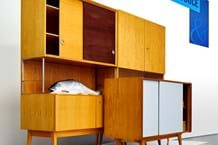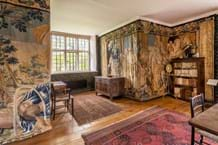It will house the firm’s offices, public reception area, parking for 60 cars, 500m2 of storage space, and a high-ceilinged, 400m2 saleroom, set to witness its first auction (of 19th century furniture) on September 25.
The new saleroom will also stage the firm’s fortnightly uncatalogued sales, and double as a viewing area – but most catalogue sales will continue to be held at the Galerie de Chartres, a late Gothic 16th century chapel in the town centre, that was saved from destruction – and converted for auction use – by the late Jean Lelièvre in 1970.
The firm’s offices used to be housed in a small block opposite the Galerie and had become chronically over-crowded. The idea of relocating was first mooted in 1980 but shelved until five years ago when talk about France’s auction reform appeared to be gathering pace. Plans for the new building were influenced by the amount of compensation due to the étude under the terms of the reform.
At Chartres, voluntary (as opposed to court-order) sales account for 95 per cent of turnover and, with compensation affected by recent profits from such sales, the firm can expect their hand-out – due by the middle of next year – to cover over a third of the building’s total cost of £1m. The rest will be met by a 15-year bank loan.
Jean-Pierre Lelièvre says the firm’s ambition has raised eyebrows among French colleagues. “Some say we’re crazy, others want to know whom we’ve jumped into bed with!” he grins. With foreign auctioneers poised to sell in France for the first time by the end of the year, the traditionally staid world of the commissaires-priseurs is alive with rumours of mergers and alliances, but Lelièvre is adamant that his firm is independent and keen to remain so. In any case, he says, the consequences of the reform are still hard to predict. “We’re all wondering what’s going to happen” he admits candidly.
The firm have certainly thought big: they say the new site offers scope to double their number of staff (currently 10 permanent employees, plus five extra on auction days). But Lelièvre is adamant that the firm have not over-reached themselves and could support a 20 per cent fall in annual turnover (around £7m in 2000) without undue worry.
The late Jean Lelièvre was one of the first French auctioneers to see the long-term benefits of specialisation back in the 1970s and Chartres has since made an international name for itself for sales of toys, dolls and automatons. Such sales attract commission bids from around 200 regular clients – interest from America, Germany and Italy is particularly strong – with many of those clients interested in up to a dozen lots.
Jean-Pierre Lelièvre, who succeeded his father as head of the firm in 1992, now considers that the importance of Chartres as a centre for auctions of toys and dolls matches that of London and Zurich. But the dynamic Lelièvre fils, helped by his associates Pascal Maiche and Alain Paris, has been quick to broaden the firm’s specialist scope. Lelièvre himself directs sales of dolls, toys and photographs; Maiche hones in on wireless sets, cameras, books, textiles and posters; and Paris concentrates on Dinky toys, arms, jewellery, silver, ceramics and Art Nouveau-Art Deco. Model trains are another house speciality and, although they usually come under Lelièvre’s purview, anything to do with the HO gauge is Maiche’s domain.
Specialist sales now account for 60 per cent of the 40,000 lots the firm sells each year. Lelièvre says that many of the pictures, furniture and works of art that make up the other 40 per cent are consigned by clients first attracted to the firm through specialist sales.
Changing places – and faces – in the French auction world
FRANCE: New auction premises were inaugurated by Lelièvre-Maiche-Paris in Chartres, 55 miles south-west of Paris, at the start of September. Architect Philippe Redreau’s futuristic, hi-tech building, painted black to emphasize its sleek outlines, is situated in the suburb of Le Coudray, just off the Chartres rocade (ring-road) two miles south-west of the town centre.




